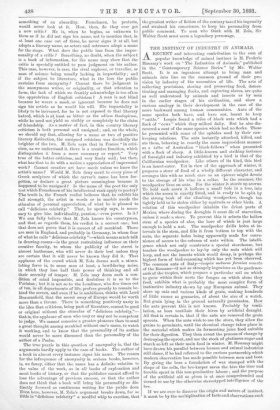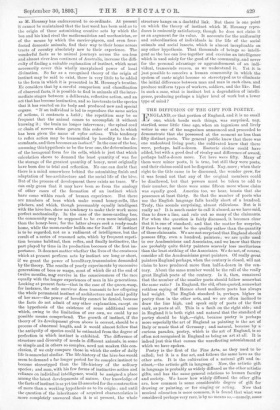THE INSTINCT OF INDUSTRY IN ANIMALS.
ARECENT and interesting contribution to the sum of popular knowledge of animal instinct is M. Frederic Houssay's work on "The Industries of Animals," published in the "Contemporary Science Series" by Mr. Walter Scott. It is an ingenious attempt to bring man and animals into line on the common ground of their pro- vision by industry of the necessities of life. The arts of collecting provisions, storing and preserving food, domes- ticating and managing flocks, and capturing slaves, are quite as well understood by animals and insects as by man in the earlier stages of his civilisation, and show a curious analogy in their development in the case of the more backward among human communities. Ants of the same species both have, and have not, learnt to keep "cattle." Lespes found a tribe of black ants which had a flock of " cows " which they milked daily. But he also dis- covered a nest of the same species which had no flocks. These he presented with some of the aphides used by their cow- keeping relations. The ants instantly attacked, killed, and ate them, behaving in exactly the same improvident manner as a tribe of Australian " black-fellows " when presented with a flock of sheep. A little-known and striking instance of foresight and industry exhibited by a bird is that of the Californian woodpecker. Like others of its kind, this bird is an insect-eater. Yet in view of the approach of winter, it prepares a store of food of a wholly different character, and arranges this with as much care as an epicure might devote to the storage of his wine in a cellar. In the summer, the woodpecker lives on ants. For the winter it stores up acorns. To hold each acorn it hollows a small hole in a tree, into which the acorn is exactly fitted, and is ready to be split by the strong beak of the climbing woodpecker, though too tightly held to be stolen either by squirrels or other birds. A relation of this woodpecker inhabits the driest parts of Mexico, where during the droughts it must die of starvation, unless it made a store. To prevent this it selects the hollow stem of a species of aloe, the bore of which is just large enough to hold a nut. The woodpecker drills holes at in- tervals in the stem, and fills it from bottom to top with the nuts, the separate holes being apparently made for conve- nience of access to the column of nuts within. The intelli- gence which not only constructs a special storehouse, but teaches the woodpecker to lay-by only the nuts which will keep, and not the insects which would decay, is perhaps the highest form of bird-reasoning which has yet been observed. The common ants of Italy—inapice met aerie farmioa senectio of the Romans—if not so strangely ingenious as the gardener- ant'S of the tropics, which prepare a particular soil on which to grow within their nests the fungus on which alone they feed, exhibits what is probably the most complex form of instinctive industry shown by any European animal. They store up oats and various kinds of grain, making hundreds of little rooms as granaries, of about the size of a watch. But grain lying in the ground naturally germinates. How the ants prevent this is not known. Probably by venti- lation, as bees ventilate their hives by artificial draught. All that is certain is, that if the ants are removed the grain sprouts. When the ants wish to use the store, they allow the grains to germinate, until the chemical change takes place in the material which makes its fermenting juice food suitable for their digestion. They then arrest the process of change by destroying the sprout, and use the stock of glutinous sugar and starch so left as their main food in winter. M. Houssay might have drawn his parallel between human and animal industries still closer, if he had referred to the curious partnership which modern observation has made possible between men and bees. By giving the bees a foundation of wax stamped with the shape of the cells, the bee-keeper saves the hive the time and trouble spent in this non-productive labour ; and the purpose of the artificial aid so given is at once comprehended and turned to use by the otherwise stereotyped intelligence of the bee.
If we are ever to discover the origin and nature of instinct, it must be by the multiplication of facts and observations such as M. Houssay has endeavoured to co-ordinate. At present it cannot be maintained that the last word has been said as to the origin of those astonishing creative acts by which the bee and his kind rival the mathematician and mechanician, or of the means by which the carrier-pigeon, and even four- footed domestic animals, find their way to their home across tracts of country absolutely new to their experience. The wonderful facts as to animal journeys across the sea-less and almost river-less continent of Australia, increase the diffi- culty of finding a suitable explanation of instinct, which must necessarily cover this wholly unexplained power of local divination. So far as a recognised theory of the origin of instinct may be said to exist, there is very little to be added to the form in which it is presented in M. Houssay's treatise. He considers that by a careful comparison and classification of observed facts, it is possible to find in animals all the inter- mediate stages between a deliberate, reflective action, and an act that has .becomeinstinctive, and so inveterate to the species that it has reacted on its body and produced new and special organs. "If an individual is led to reproduce the same series of actions, it contracts a habit ; the repetition may be so frequent that the animal comes to accomplish it without knowing it ; the brain no longer intervenes ; the spinal cord or chain of nerves alone govern this order of acts, to which has been given the name of reflex actions. This tendency to reflex action may be transmitted by heredity to the de- scendants, and then becomes an instinct." In the case of the bee, assuming this hypothesis to be the true one, the determination of the hexagonal form for its cells, which is just that which calculation shows to demand the least quantity of wax for the storage of the greatest quantity of honey, must originally have been due to trial and reflection, No one can doubt that there is a mind somewhere behind the astonishing finish and adaptation of bee-architecture and the social life of the hive. But of the process of development there exists no trace. We can only guess that it may have been so from the analogy of other cases of the formation of an instinct which have come within reach of human experience. But there are numbers of bees which make round honey-cells, like pitchers, and which, though presumably equally intelligent with the hive-bee, show no tendency to make their work more perfect mechanically. In the ease of the moss-carding bee, the community may be supposed to be even more intelligent than the honey-bees; for the latter always seek a ready-made home, while the moss-carder builds one for itself. If instinct is to be regarded, not as a rudiment of intelligence, but the result of a series of reasoned acts, which by frequent repeti- tion became habitual, then reflex, and finally instinctive, the part played by time in its production becomes of the first im- portance. It does not matter whether the lives of the creatures which at present perform acts by instinct are long or short, if we grant the power of hereditary.transmission demanded by the theory. The results of yearly experiments by successive generations of bees or wasps, most of which die at the end of twelve months, mu survive in the consciousness of the race equally with the longer experiences of man in his generations. Looking at present facts—that in the case of the queen-wasp, for instance, the sole survivor does transmit to her offspring the whole permanent instinct of architecture and social polity of her race—the power of heredity cannot be denied, because the facts do not admit of any other explanation, except on the hypothesis of the existence of some additional sense which, owing to the limitation of our own, we could by no possible means comprehend. The growth of instinct, if the theory of its development given above is correct, should be a procese of abnormal length, and it would almost follow that the antiquity of species could be estimated from the degree of perfection in which instinct is exhibited. The difference of structure and diversity of needs in different animals, in some so simple and in others so complex, need not weaken this con- clusion, if we only compare those in which the order of daily life is somewhat similar. The life-history of the hive-bee would seem to demand a far longer period for its complex instinct to become stereotyped than the life-history of the solitary species ; and man, with his few forms of instinctive action and reliance on individual intelligence, would be assigned a place among the latest developments of nature. Our knowledge of the facts of instinct is as yet too ill-assorted for the construction of more than a working hypothesis as to its origin ; and until the question of the inheritance of acquired characteristics is more completely answered than it is at present, the whole structure hangs on a doubtful link. But there is one point on which the theory of instinct which M. Houssay repro- duces is eminently satisfactory, though he does not claim it as an argument for its value. It accounts for the uniformity and subordination of individuals in the life of the social animals and social insects, which is almost inexplicable on any other hypothesis. That thousands of beings so intelli- gent as the bee can live together and exercise an intelligence which is used solely for the good of the community, and never for the personal advantage or aggrandisement of an indi- vidual, transcends reason, as we understand it. Yet it is just possible to conceive a human community in which the system of caste might become so stereotyped as to eliminate the initial difference between man and man in each class, and produce uniform types of workers, soldiers, and the like. But in such a case, what is instinct but a degradation of intelli- gence, producing perhaps a higher level of work but a lower type of mind ?



































 Previous page
Previous page